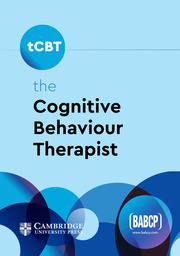-
- Get access
- Contains open access
- ISSN: 1754-470X (Online)
- Editor: Dr Richard Thwaites North Cumbria Talking Therapies, Cumbria, UK
- Editorial board
tCBT is keen to contribute to increased inclusivity and progress towards equity within the field of CBT. It therefore welcomes submissions on topics that impact on practitioners and patients from minoritised identities (such as, but not limited to, sexuality, gender, ethnicity). We encourage all authors and reviewers to support the journal’s aims by considering inclusivity of people with minoritised identities within submissions where appropriate. This could for example be discussion of the ethnicities of research participants, reference to specific issues that may be relevant for people from minoritised groups within clinical guidance papers or acknowledgement of gaps in our knowledge.
Recently Published Articles
Cambridge Core Blog

-
Overcoming therapists’ worries around treating PTSD following rape: the creation of a ‘how to’ guide for therapists.
- 08 April 2025,
- The April BABCP Article of the Month is from the Cognitive Behaviour Therapist and is entitled “How to treat someone suffering with PTSD following rape in adulthood”...

-
Introducing a Psychological Formulation Model of Maladaptive Daydreaming
- 12 March 2025,
- The March BABCP Article of the Month is from the Cognitive Behaviour Therapist and is entitled “Introducing a psychological formulation model of maladaptive Our journey began with Amy’s doctoral thesis, delving into the uncharted depths of Maladaptive Daydreaming (MD) and ‘dark fantasy’ (Lucas, 2021).…...

-
Should we focus more on mental imagery to improve adolescent mental health? Clues from anxiety and “flashforwards”
- 03 December 2024,
- The December BABCP Article of the Month is from Behavioural and Cognitive Psychotherapy and is entitled “‘Flashforward’ mental imagery in adolescents: Current CBT interventions are often thought to rely on “verbal thinking” yet much of our mental lives is also shaped by mental images – imagining visual scenes, sounds, smells, etc.…...

Facebook